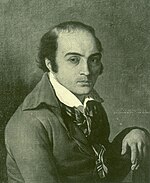André Chénier
| André Chénier | |
|---|---|

Portrait during his last captivity by Suvée
|
|
| Born |
30 October 1762 Constantinople, Ottoman Empire |
| Died | 25 July 1794 (aged 31) Paris |
| Occupation | Writer |
| Nationality | French |
| Genre | Poetry |
André Marie Chénier (30 October 1762 – 25 July 1794) was a French poet of Greek and Franco-Levantine origin, associated with the events of the French Revolution of which he was a victim. His sensual, emotive poetry marks him as one of the precursors of the Romantic movement. His career was brought to an abrupt end when he was guillotined for supposed "crimes against the state", near the end of the Reign of Terror. Chénier's life has been the subject of Umberto Giordano's opera Andrea Chénier and other works of art.
He was born in the Galata district of Constantinople. His family home, destroyed in a fire, was located on the site of the present Saint Pierre Han, in today's Karaköy neighborhood of Istanbul. His father, Louis Chénier, a native of Languedoc, after twenty years in the Levant as a cloth-merchant, was appointed to a position equivalent to that of French consul at Constantinople. His mother, Élisabeth Santi-Lomaca, whose sister was grandmother of Adolphe Thiers, was of Greek origins. When André was three years old, his father returned to France, and from 1768 to 1775 served as consul-general of France in Morocco. The family, of which André was the third son, and Marie-Joseph (see below) the fourth, remained in France; and after a few years, during which André was given his youthful freedom while living with an aunt in Carcassonne; a square in Carcassonne is named to commemorate him. He distinguished himself as a verse-translator from the classics at the Collège de Navarre in Paris.
In 1783 he enlisted in a French regiment at Strasbourg, but the novelty soon wore off. He returned to Paris before the end of the year, was well received by his family, and mixed in the cultivated circle which frequented his mother's salon, including Lebrun-Pindare, Antoine Lavoisier, Jean François Lesueur, Claude Joseph Dorat, and, a little later, the painter Jacques-Louis David.
...
Wikipedia
